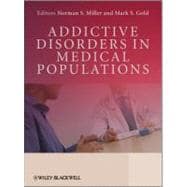
Note: Supplemental materials are not guaranteed with Rental or Used book purchases.
Purchase Benefits
What is included with this book?
Mark S. Gold, M.D. is an editor, author, teacher, pioneer, researcher and inventor, who has worked for nearly 40 years to create models for understanding the effects of tobacco, opiates and other drugs on the brain and behavior. He has developed models that have led to the discovery of new addiction treatments and has conceptualized novel hypotheses which yielded new approaches to the definition and treatment of addictions. Dr. Gold's pioneering work on the brain systems underlying the effects of opiate drugs led to a dramatic change in the way opiate action was understood and his seminal work on cocaine is considered classic translational science. Over the past decade, he has defined hedonic overeating as an addiction and developed animal and imaging models to develop new treatments for overeating and obesity. Most recently, he and his colleagues demonstrated that intravenously administered anesthetics and analgesics are exhaled in the air of operating rooms, present on surfaces, and available for second hand exposure. Dr. Gold and colleagues have explained the role of the workplace environment in physician drug abuse, addictions and relapse after successful treatment. Under his leadership, the Department of Psychiatry at the University of Florida has grown to 60 full-time clinical physicians and researchers with new projects and research groups in secondhand exposure models, functional brain imaging, self-administration, public health, impaired professionals, genomics, proteomics and nanotechnology. Dr. Gold has been awarded numerous national prizes and recognition for his work, leadership, and mentoring. Since beginning his career in research at the University of Florida in 1970, he has been the author of over 900 medical articles, chapters, and abstracts in journals for health professionals on a wide variety of psychiatric research subjects and has authored 12 professional books including practice guidelines, ASAM core competencies, and medical text books for primary care professionals. He is the author of 15 general audience books. According to a review in the Journal of the American Medical Association (JAMA 272:18, 1996), "Mark S. Gold, M.D. the most prolific and brilliant of the addiction experts writing today... Dr. Gold has spent his career trying to bridge the gap in medical education and practice with the belief that addictions are diseases and that all physicians have a critical role in prevention and, if that fails, in early identification and prompt treatment."
| List of Contributors | |
| Preface | |
| Acknowledgements | |
| Addictive Disorders and Medicine | |
| Addictive Disorders as an Integral Part of the Practice of Medicine | |
| Crime, Substance Use, and Mental Illness | |
| Ethical Issues in Addiction Medicine | |
| Natural History of Addictive Diseases | |
| Prevention Methods: School, Family, Community, Media and Public Policy Approaches | |
| Assessment and Diagnosis | |
| Screening and Diagnosis of Substance Use Disorders | |
| Clinical Pharmacology of Addicting Drugs | |
| Laboratory Diagnosis of Addicting Drugs | |
| Cutaneous Manifestations of Drug Addiction | |
| Addictive Disorders and Clinical Diseases | |
| Addictive Disorders in Primary Care Medicine | |
| Addictive Disorders in the Intensive Care Unit | |
| Addictive Disorders in Trauma Center Patients | |
| Addictive Disorders in Psychiatric Medicine | |
| Addiction and Short-Term Pain Management | |
| Prescription Opiate Medications: Clinical Assessment and Treatment of Tolerance and Dependence | |
| Substance Addiction and HIV Infection: Scope of the Problem and Management | |
| Addictive Disorders in Cardiovascular Medicine | |
| Alcohol Use and Diseases of the Eye | |
| Addictive Disorders in Nutritional Diseases - From an Addictions Viewpoint | |
| Addictive Disorders in Nutritional Diseases - From a Nutritional Viewpoint | |
| Gastrointestinal Diseases Associated with Substance Addiction | |
| Addictive Disorders in Malignant Diseases | |
| Substance Addiction and Gastrointestinal Malignancy | |
| Renal Manifestations of Recreational Drug Use | |
| Addictive Disorder in Urological Diseases | |
| Management of Addictive Disorders in Selected Populations | |
| Management of Addictive Disorders in Medical Nursing Care Populations | |
| Management of Addictive Disorders in Surgical Nursing Care Practice | |
| Addictive Disorders in Psychology Practice | |
| Addictive Disorders in Diseases of Women | |
| Children and Adolescents with ADHD: Risk and Protective Factors for Addictive Disorders | |
| Addictive Disorders in the Elderly | |
| Treatment of Addictive Disorders | |
| Pharmacological Therapeutics for Detoxification in Addictive Disorders | |
| Pharmacological Therapeutics for Relapse Reduction in Addictive Disorders | |
| Psychosocial Treatments for Addictive Disorders: Models, Settings, and Important Roles for Referring Physicians | |
| Treatment Models for Comorbid Psychiatric and Addictive Disorders | |
| Brief Interventions for Alcohol and Drug Problems | |
| Treatment Outcomes for Addictive Disorders | |
| Biopsychosocial Recovery from Addictive Disorders | |
| Index | |
| Table of Contents provided by Publisher. All Rights Reserved. |
The New copy of this book will include any supplemental materials advertised. Please check the title of the book to determine if it should include any access cards, study guides, lab manuals, CDs, etc.
The Used, Rental and eBook copies of this book are not guaranteed to include any supplemental materials. Typically, only the book itself is included. This is true even if the title states it includes any access cards, study guides, lab manuals, CDs, etc.